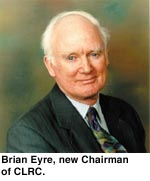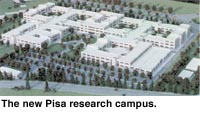

ERCIM News No.41 - April 2000 [contents]
SINTEF Telecom and Informatics has signed a contract with BAE-Systems to develop a system for natural communication in rough environments (NACRE). The concept for this system was presented on the ERCIM 10th anniversary CD-Rom. BAE-Systems is the second largest company in Europe within aviation, space technology and defence systems with more than 90.000 employees. The Norwegian Air Force is currently negotiating a contract for renewal of fighter aircraft. The NACRE-system will be implemented in the Eurofighter which is a possible candidate for this contract.
SINTEF has celebrated its 50th anniversary. The research foundation SINTEF was founded in 1950 by The Norwegian Institute of Technology in order to strengthen the ties between the university and Norwegian industry and to promote applied research. SINTEF operates in close collaboration with the Norwegian University of Science and Technology (NTNU). The two institutions cooperate in projects and share laboratories and equipment. Together, they form a center of expertise of high international standard. SINTEF also cooperates with the University of Oslo. With about 1800 employees and an annual turnover of NOK 1,5 billion, SINTEF is one of Europe’s largest independent research organizations. Contracts from the public and private sectors provide 92% of the operating revenue.
The work of four members of CLRC’s staff were recognised in the 2000 New Year Honours list, amongst them Dr Gordon Walker and Professor Bob Hopgood, both of whom were awarded the Order of the British Empire (OBE) by the Queen. Dr Gordon Walker has worked at Rutherford Appleton Laboratory for 37 years and was recently appointed Chief Operating Officer for CLRC, responsible for the day-to-day operations of RAL and Daresbury Laboratory, its sister laboratory in Cheshire. Professor Bob Hopgood has been involved in computer graphics since 1959 including pioneering work on computer animation. He currently chairs the BSI Committee responsible for computer graphics and image processing standardisation. More recently he has been involved with the World Wide Web Consortium (W3C) helping to develop standards for the Web and setting up W3C European regional offices including the W3C UK Office at RAL. Bob is Professor of Computer Science at Brunel University where he has taught since 1968. He also has an Honorary Doctorate from the Technical University of Darmstadt, awarded for his trend setting activities in the field of computer graphics. Bob Hopgood is retiring from CLRC in April 2000, he is taking up the position of Head of Offices for W3C and will be based at CLRC – so he won’t escape entirely! Bob will also continue with his work and positions at UK universities.
 Professor Brian Eyre has been appointed to the new post of Chairman of CLRC (CCLRC). Eyre who has been a member of CCLRC’s council since 1998, is appointed for one year from 1 April 2000. Dr Gordon Walker, the present Director for Research & Development at CCLRC, has been appointed Chief Operating Officer and will be Acting Chief Executive from 1 April 2000 until a new Chief Executive is appointed through open competition. Dr Albert Westwood completes his term of office as Chairman and Chief Executive of CCLRC on 31 March 2000. In future CCLRC will have an independent part time Chairman and a full time Chief Executive, bringing it into line with the other six Research Councils in the UK.
Professor Brian Eyre has been appointed to the new post of Chairman of CLRC (CCLRC). Eyre who has been a member of CCLRC’s council since 1998, is appointed for one year from 1 April 2000. Dr Gordon Walker, the present Director for Research & Development at CCLRC, has been appointed Chief Operating Officer and will be Acting Chief Executive from 1 April 2000 until a new Chief Executive is appointed through open competition. Dr Albert Westwood completes his term of office as Chairman and Chief Executive of CCLRC on 31 March 2000. In future CCLRC will have an independent part time Chairman and a full time Chief Executive, bringing it into line with the other six Research Councils in the UK.
 The CNR Informatics Institutes in Pisa have moved from their separate sites in the historical city centre to the new CNR Research Area on the outskirts of town. CNUCE, IAT, IEI, ILC and IMC, whose research activities encompass practically all sectors of IT and Computer Science, are now located on the same site. The new research campus will provide them with a number of important facilities, such as a Conference centre and printing services, which previously were lacking. When the Pisan Area of Research is fully operational, it will be constituted by 15 CNR research institutes working in various fields of the applied sciences (including Biology and Medicine, Physics, Chemistry, Environmental and Earth Sciences) with approximately 600 research, technical and administrative staff.
The CNR Informatics Institutes in Pisa have moved from their separate sites in the historical city centre to the new CNR Research Area on the outskirts of town. CNUCE, IAT, IEI, ILC and IMC, whose research activities encompass practically all sectors of IT and Computer Science, are now located on the same site. The new research campus will provide them with a number of important facilities, such as a Conference centre and printing services, which previously were lacking. When the Pisan Area of Research is fully operational, it will be constituted by 15 CNR research institutes working in various fields of the applied sciences (including Biology and Medicine, Physics, Chemistry, Environmental and Earth Sciences) with approximately 600 research, technical and administrative staff.
ERCIM organizes Information Days on the European Information Society Technologies Programme in Latin America with support from the European Commission. The objective is to raise awareness among the Latin American S&T actors about the opportunities related to the calls for proposals issued by this programme. Detailed information is given on the strategy of the programme, the content of its annual workplan, the available modalities for participation, and the coming ‘roadmap’ for its activities. ERCIM will produce a report to identify subjects of common interest and recommend actions or mechanisms for funding bodies in order to increase the R&D co-operation between Europe and Latin America in Information Technologies. After a very successful Information Day 16 March in Mexico City, two further Info Days will be held 4 April in Rio de Janeiro and later on in Buenos Aires. For details, see http://www.ercim.eu/EU-LA/.
 Professor Brian Eyre has been appointed to the new post of Chairman of CLRC (CCLRC). Eyre who has been a member of CCLRC’s council since 1998, is appointed for one year from 1 April 2000. Dr Gordon Walker, the present Director for Research & Development at CCLRC, has been appointed Chief Operating Officer and will be Acting Chief Executive from 1 April 2000 until a new Chief Executive is appointed through open competition. Dr Albert Westwood completes his term of office as Chairman and Chief Executive of CCLRC on 31 March 2000. In future CCLRC will have an independent part time Chairman and a full time Chief Executive, bringing it into line with the other six Research Councils in the UK.
Professor Brian Eyre has been appointed to the new post of Chairman of CLRC (CCLRC). Eyre who has been a member of CCLRC’s council since 1998, is appointed for one year from 1 April 2000. Dr Gordon Walker, the present Director for Research & Development at CCLRC, has been appointed Chief Operating Officer and will be Acting Chief Executive from 1 April 2000 until a new Chief Executive is appointed through open competition. Dr Albert Westwood completes his term of office as Chairman and Chief Executive of CCLRC on 31 March 2000. In future CCLRC will have an independent part time Chairman and a full time Chief Executive, bringing it into line with the other six Research Councils in the UK.
 The CNR Informatics Institutes in Pisa have moved from their separate sites in the historical city centre to the new CNR Research Area on the outskirts of town. CNUCE, IAT, IEI, ILC and IMC, whose research activities encompass practically all sectors of IT and Computer Science, are now located on the same site. The new research campus will provide them with a number of important facilities, such as a Conference centre and printing services, which previously were lacking. When the Pisan Area of Research is fully operational, it will be constituted by 15 CNR research institutes working in various fields of the applied sciences (including Biology and Medicine, Physics, Chemistry, Environmental and Earth Sciences) with approximately 600 research, technical and administrative staff.
The CNR Informatics Institutes in Pisa have moved from their separate sites in the historical city centre to the new CNR Research Area on the outskirts of town. CNUCE, IAT, IEI, ILC and IMC, whose research activities encompass practically all sectors of IT and Computer Science, are now located on the same site. The new research campus will provide them with a number of important facilities, such as a Conference centre and printing services, which previously were lacking. When the Pisan Area of Research is fully operational, it will be constituted by 15 CNR research institutes working in various fields of the applied sciences (including Biology and Medicine, Physics, Chemistry, Environmental and Earth Sciences) with approximately 600 research, technical and administrative staff.